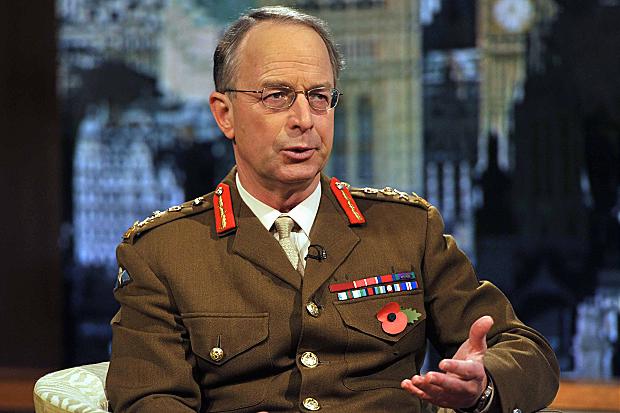ISIL Threat: Generals salute the 'all-or-nothing' approach
30/09/2014
'Do it properly, or don't do it at all.'
At the height of the Second World War, Britain's most senior soldier would pen furious diary entries about his political masters, particularly that "public menace" Winston Churchill.
"The more I see of politicians, the less I think of them," wrote General Sir Alan Brooke on July 9, 1941. "They are always terrified of public opinion. I cannot see how our present system of democracy can produce real qualified leaders of a nation."
If this formidable Ulsterman were around today, he would be apoplectic about how our politicians have bound the hands of Britain's military response to Isil. Telling the RAF to bomb terrorists in Iraq but not in Syria, where Isil has its headquarters, would have provoked pages of scorn in the Brooke diary. Ruling out deploying British combat troops would have drawn his derision.
The maxim of British generals down the ages might be summarised thus: "Do it properly, or don't do it at all." By imposing arbitrary constraints on our campaign against Isil, Britain's politicians have offended the holy texts of military logic.
But what are elected leaders supposed to do? Brooke himself was pretty suspicious of democracy. When liberty hung by a thread in 1941, he questioned whether representative government was worth preserving. "The more I see of democracy, the more I doubt our wisdom of attaching such importance to it!" wrote the man who was sending countless thousands of soldiers to die in its defence.
Lord Richards, formerly General Sir David Richards, retired last year as Chief of the Defence Staff (CDS) and Brooke's linear successor. He is the high priest of the "do-everything-or-do-nothing" school of military advice.
"You can't possibly defeat Isil by only attacking them in Iraq," he told a Sunday newspaper. "How the hell can you win the war when most of your enemy can end up in a country [Syria] you can't get involved in?" he asked with an authentically Brookeian flourish.
On this point, Lord Richards is right. And the military approach that he embodies is grounded in good sense.
Far from being the warmongers of popular caricature, British generals take pride in being reluctant warriors. Those I have met are thoughtful, humane, understated and mindful of the limitations on what soldiers can achieve. Do not expect too much of us, they say. All we can ever do is buy time for the politicians to sort things out.
When ministers ask for military options, a British general's instinctive reaction will be to question whether force is necessary at all. He will first ask if every alternative has been exhausted. Then, if war really is the only option, the general will want to win quickly and with the lowest possible loss of life.
Hence the commander's visceral loathing of half-measures. Generals do not want to fight, but if there is no other way, they owe it to their soldiers to ensure that everything is in place for a swift victory.
In its own terms, the all-or-nothing approach makes perfect sense. There is only one problem: it often collides with hard reality.
In this world of compromise and shades of grey, generals only have to consider strategy and objectives. Politicians must think about the whole picture. If a cautious general tells them either to stay out of an international crisis, or intervene with everything in the locker, then elected leaders will usually end up doing nothing.
Force them to take a binary decision and, more often than not, you will give them an excuse for inaction.
And that is how Lord Richards erred over Syria. As CDS in 2012, Lord Richards told the Government there was only one way to get rid of Bashar al-Assad. Britain and its allies would have to spend a whole year and billions of pounds on training 100,000 rebels at special camps in Turkey and Jordan. This force would then be launched over the border into Syria to capture Damascus, helped by air strikes from the RAF and the US Air Force.
Asked to choose between doing nothing, or adopting this sweepingly ambitious war-plan, our politicians understandably decided to sit on their hands. Lord Richards is not naive: he must have anticipated their choice. Was his plan drawn up in order to be rejected?
And was there really no other way to get rid of Assad? In the summer of 2012, after all, the dictator was staring into a precipice. His enemies had captured most of Syria and rebel units were striking in the heart of Damascus, attacking military bases within sight of the presidential palace. Would it have required a new army of 100,000 men to shove Assad over the edge? Why not trust the judgment of his main allies, Iran and Hizbollah, who clearly took the prospect of Assad's downfall sufficiently seriously to deploy thousands of their own fighters to rescue him.
So if our failure to act in Syria has helped to create the conditions for Isil's rise, then Lord Richards carries a share of the responsibility.
Back in 1941, imagination was the quality that Brooke most suspected in Churchill. Today's generals need enough imagination to go beyond the paralysing doctrine of "all-or-nothing".

